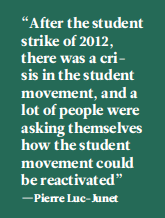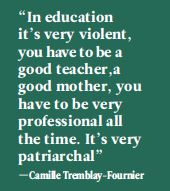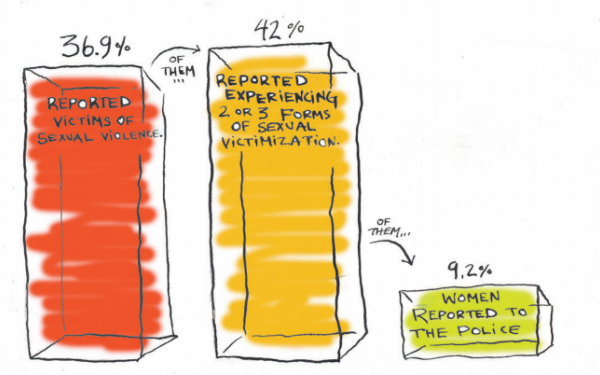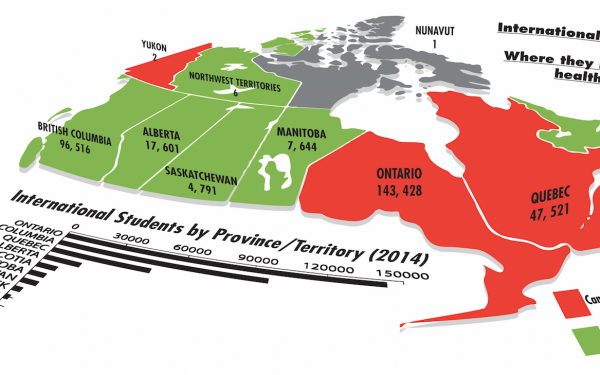Quebec Students Gear Up to Fight Against Unpaid Internships
CSU, AVEQ Begin Yearly Campaign
Students all over the world today have experienced, or will experience, unpaid internships.
Whether it’s due to a course requirement for graduation, or as a point of entry into a competitive job market, internships are part of a new reality faced by students everywhere.
Internships are more than a method of gaining skills associated with a student’s career of choice. The exponential growth of unpaid internships represents a structural change in the economy, and the effects of this change are felt everywhere.
Companies lay off, or don’t hire, workers because they rely on the unpaid labour of interns. Entry-level jobs once seen as a necessary liability are more and more being transformed into unpaid internships. Training periods, which were historically paid for by companies, are less likely to be paid. More fields than ever rely on the labour of interns for basic tasks.
This reality has not come without contestation. Mobilization against unpaid internships began last year on Montreal campuses like Université du Québec à Montréal. The fight for remunerated student labour is now gradually spreading to Concordia and McGill Universities, where both undergraduate unions have begun year-long campaigns to push for paid internships. Organizers hope to build a broad-based student movement against unpaid internships that’s capable of challenging this new system of unpaid labour.
In many programs at Concordia, an internship is required for graduation.
Students get a form of compensation for their work in these internships, since they get course credit in return. However, very few programs at Concordia enforce that internships be paid. In fact, some programs go so far as to only allow students to get course credit if the internship is unpaid.
If you’re a student in applied human sciences, art education, geography, music, theatre, contemporary dance, or human relations, you’re one of those students only allowed to take unpaid internships.
The Concordia Student Union wants to see an end to that. Its campaign for the year is to lay down the groundwork to ensure that, in the future, all for-credit internships at Concordia are paid. To do so, the CSU is working hand in hand with the Association for the Voice of Education in Quebec, the provincial federation they’re part of, which will focus on putting pressure on the provincial level.
But before the CSU and AVEQ start making formal demands to Concordia’s administration and the provincial government, they need to convince students to change the lens through which they view their own education and their own labour.
“It only makes sense that it should be remunerated, it is labour. The discourse needs to be shifted in terms of how we talk about these things,” says Asma Mushtaq, the academic and advocacy coordinator with the CSU, who’s helping lead their yearly campaign against unpaid internships.
Both her and the CSU’s mobilization coordinator Ahmed Badr, who is also leading the campaign, agree that students are routinely exploited by employers who feel they are doing students a favour by giving them unpaid internships.
“We accept unpaid internships because we need to get experience, we need to have it for our careers,” says Badr. “Some people take advantage of our need to have experience.”
They hope that as students become more vocal about their needs, employers will change the way they interact with student labour and begin to place a higher value on it.
Those in typically feminine fields tend to get the shorter end of the stick, says Mushtaq.“There’s unequal conditions in terms of how [unpaid internships] are applied, and there’s not a standardized benchmark for it,” she explains. “Especially for generally feminized fields.”
Students from the faculty of Engineering and Computer Science who get accepted into Concordia’s Institute for Aerospace Design and Innovation get the chance to take on paid internships. These internships aren’t for course credit, but unlike a student in art education who will be forced to do unpaid internships to graduate, students in aerospace design and innovation get paid $20 per hour, for an internship that lasts 500 hours or more.
“Some people take advantage of our need to have experience.” — Ahmed Badr
Other students who want to get paid for their internships can apply to be part of Concordia’s co-op program, which helps set students up with paid internships according to their field of study. However, only certain programs allow their students to apply for the co-op program, and none of the programs where unpaid internships are required take part in the program.
In line with what Mushtaq’s noticed, many of the programs that are part of the co-op program at Concordia are those in traditionally masculine fields. There are significantly more options for paid internships in Engineering and Computer Science and the John Molson School of Business, but comparatively less for fields that have long been seen as feminine such as the social sciences. In the fine arts department, the only program eligible for the co-op internships for students is art history, and the application is now listed as unavailable.
Mushtaq wishes there was a more centralized way of overseeing for-credit internships at Concordia, so that students from all programs could take part in internships of the same caliber. Some programs issue out surveys to their students after they end their internships, whereas others don’t, she says.
The result is that it’s hard to track whether students are getting the most out of their internships, and it’s hard to track which students are being exploited. She says that, unfortunately, students who are looking to gain knowledge and experience may get distracted from those goals, since their employer may have interests which are not in line with those of the student.
Beyond criticisms of legal internships, many students also take part in illegal internships. This happens because of a general lack of knowledge on what constitutes a legal internship.
For an internship to be considered legal in Quebec, it either has to be part of a government-approved training program overseen and directed by an educational institution, be part of a vocational school training program, or be done for a non-profit organization.
It’s unclear whether or not those who take on internships outside of these parameters have the legal right to a wage.
In 2012, Jainna Patel filed a labour complaint against Bell Canada for a 5 week internship she did with Bell Mobility in its Professional Management Program in Mississauga, Ont., and demanded she be paid a wage for her time. Her complaint was later rejected by Human Resources and Development Canada, but her choice to file a labour complaint did make some difference: Bell Canada later discontinued that internship.Interns within those three parameters are also exempt from protection under Quebec’s law on labour standards.That means they get no guarantee of a minimum wage, paid holidays, or the right to absence leave if they’re sick or need to see their family. It also means they can legally be unpaid, even if the intern is working an hourly schedule the same way any other employee would.
Viewing this relationship as exploitative, AVEQ’s campaign against unpaid internships argues that it’s unfair to have interns exempt from protection the labour law. Beyond giving support to the CSU, AVEQ is getting ready to pressure the provincial government to rewrite the law and remove the exemption for interns. If changed, it would assure interns a minimum wage, and would also allow interns to receive the same protection that other legal employees are allotted under the law.
On Oct. 11, the provincial government said in a press release that they would be making reforms to current labour standards law, leaving it now especially vulnerable to criticism from the student movement.
Widespread unpaid internships perpetuate the privilege of the rich, says AVEQ mobilization coordinator Kristin Perry, since those who can’t afford to work without a wage will have to move on to other things. On the other hand, those who are fortunate enough to live at home or who don’t pay rent can take on the financial burden that comes with doing multiple unpaid internships.
In the end, Perry says, the person with more work experience will be more likely to get hired. The other person, who would otherwise have been equally qualified for the job, often ends up being brushed aside because they lack the experience necessary to compete.
“It’s making it more difficult for the people who are already being marginalized. It’s just widening the gap even farther,” Perry says.
“It’s a normalization of the struggle. That’s just what you have to do to complete your degree. But it’s a clear barrier to student’s mental and physical health, and their ability to sustain themselves financially while going to school,” says Sophia Sahrane, AVEQ’s research coordinator who’s overseeing a study on unpaid internships set to come out this academic year.
While this year’s CSU campaign against unpaid internships is the first major campaign of its type at an anglophone university, it isn’t the first in Quebec. The Comités unitaire sur le travail étudiant, are a group of committees from different Quebec campuses focused on the fight for paid internships and the betterment of student labour. The first CUTE committees were formed at UQAM and CEGEP Marie Victorin about a year and half ago.
“After the student strike of 2012, there was a crisis in the student movement, and a lot of people were asking themselves how the student movement could be reactivated,” said Pierre Luc-Junet, who started a Concordia chapter of CUTE this semester.

“There’s an internal crisis,” he says. “People don’t know how to react, what to do next.”
In 2012, many radical Montreal students advocated for free education, but CUTE pushes the argument further. The organization was formed around the idea that all students should be paid a wage for the labour that goes into finishing a degree.
“At CUTE we have a broader analysis of student labour,” he says. “We wanted to rethink the whole approach of the student condition, and the student movement.”
The idea that students deserve to be paid a wage isn’t new, and he says CUTE draws inspiration from scholars like the radical autonomist, feminist, Marxist Silvia Federici, who started the Wages for Housework campaign in 1973, and autonomist Marxist scholar George Caffentzis, who published a manifesto advocating for student wages in 1975.
Junet says that students “must be considered not as future workers that are in a transition phase between the family and the work station, but as workers. Because they’re producing something that has a value.”
As intellectual workers, students produce knowledge, and should therefore be compensated, he says. Junet acknowledges their goal is long-term, and right now the CUTE committee’s main focus is to see an end to unpaid internships.
Many of those who are part of CUTE were inspired to join because they saw the injustice of having to work for free.
UQAM education graduate Camille Tremblay-Fournier had to quit one of her unpaid internship as a preschool teacher at the Commission scolaire Pierre-Neveu in the Laurentians after being too burnt out to continue. Now she organizes with CUTE.
“In education it’s very violent, you have to be a good teacher, a good mother, you have to be very professional all the time,” she said. “It’s very patriarchal. For me it was very intense, that internship. I quit.”
Tremblay-Fournier had to do unpaid internships as part of her program, which requires her to take on four of them over four years. She says that what’s being asked of her is too much, and that interns often take on the same work as the teachers they work alongside. That’s especially the case for their final internship, where all students have to work a full semester as a teacher.
For her last semester, she worked a full semester as a sociology teacher at Cegep du Vieux Montréal.
She describes the experience as exploitative, and found it hard to strike a balance.

“It’s very complicated, to combine a lot of work at home, and at school, and to have a job after school,” she said. “It’s impossible.”
Junet also relates to the struggle.
As a fine arts student in Concordia’s film studies department, Junet says he and his colleagues get emails asking to do unpaid work on a weekly basis. He’s done an internship before with a cinema production company, and was able to get credit for it, but he left feeling ripped off. Since he had to pay for the course in his tuition fees, he felt he was paying to work.
Last summer he was offered an unpaid internship with Rencontres internationales du documentaire de Montreal, one of Canada’s biggest documentary film festivals. He considered it, out of pressure to conform, but later refused because he thought too much was being asked of him.
He said that in the first month of the internship, interns were required to work 15 or 20 hours per week, and that by the last month of the internship, interns were expected to work full time, especially during the festival’s ten day run.
“There’s people telling you that it’s a very good opportunity. If you do it well, after that you could have a job in this company. You can start your career,” he says. “That’s the irony. You start your career by being completely exploited by what will become your bosses, and that’s a fucking strange relationship when you start something. That has to be denounced totally.”
WHAT’S NEXT?
Now, CUTE and other student groups in Quebec are gearing up for a day of action on Nov. 10, declared the International Day of Interns.
A coalition of 12 different groups has been formed, made up of both CUTE committees and student associations on both university and CEGEP campuses. Students from Concordia, UQAM, Udem, and CEGEPs Marie-Victorin, Maisonneuve, and Gérald-Godin are all expected to attend.
A declaration of their demands is in the works, and will be presented publicly the day of.
Member of CUTE Thierry Beauvais- Gentile said the protest will take place at Square Victoria, and also says internal disruptions are expected at UQAM. Some student associations part of that coalition are debating going on strike that day. But so far, only the interns part of ADEESE, the education students association at UQAM, AÉTS, UQAM’s social work students association, and l’AÉMÉ, the education association at Université du Québec en Outaouais, have agreed to go on strike that day.
Strikes of this nature have been successful before. In 2016, Quebec psychology interns under the union Fédération interuniversitaire des doctorant.e.s en psychologie staged a four-month strike. With the pressure they exerted, the provincial government later agreed that from then on, all psychology interns would be paid a bursary $12,500 per semester.
“I think a few student associations are using it as a trial for an intern strike. They’re using it as a, ‘let’s see how many interns can show up,’” said Beauvais-Gentile.




_600_375_90_s_c1.jpg)
_600_375_90_s_c1.jpg)

